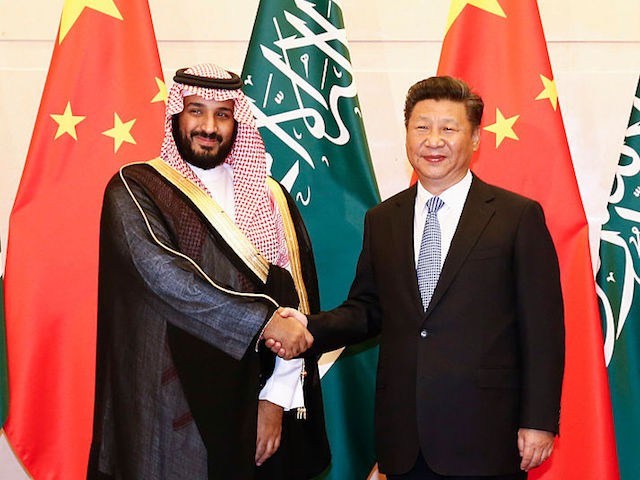Chinese dictator Xi Jinping is apparently planning a visit to Saudi Arabia next week, two months after U.S. President Joe Biden’s embarrassing trip to the kingdom.
The combination of the Biden debacle and Xi’s triumphant reception could signal a lasting reorientation for Saudi Arabia away from longtime ally America and toward Communist China.
The UK Guardian on Thursday saw an unmistakable message in the contrast between Xi’s “gala reception to match that given to Donald Trump” and the Saudi’s cool response to Biden:
The welcome being prepared for the Chinese leader is in stark contrast with that afforded to Joe Biden in June, when the US president received a low-key reception, reflecting strained ties between the two countries and personal distaste between Biden and the de facto Saudi leader, Mohammed bin Salman.
Xi, however, is instead expected to receive a bells-and-whistles welcome intended to consolidate ties between Beijing and Riyadh and reinforce the image of China as an ally of Saudi Arabia, as ties with Washington continue to drift.
China and Saudi Arabia have been growing closer over two decades, but ties have deepened as Prince Mohammed accumulated power in the kingdom from 2016 onwards. Riyadh has defended China’s treatment of its Uyghur Muslim minority and Hong Kong’s draconian national security law, placing it at odds with the US on key human rights issues.
Hudson Institute senior fellow Mohammed Alyahya told the Guardian the Saudi realignment was natural to some degree since China has become Saudi Arabia’s largest trade partner and the largest customer for its oil.
American politicians loudly proclaim their desire to move away from oil, deploying all means necessary to force their recalcitrant citizens into compliance with the “green” agenda, while China promises to burn all the fossil fuel it can get its hands on.
The Saudis would be foolish not to see America as a declining market partner, while China is not only eager to guzzle Middle Eastern oil, but willing to deploy military force to ensure the oil trade runs smoothly. The Saudis are sending unsubtle signals that they expect their allies to do a better job of protecting the oil industry against terrorism.
The Guardian alluded to another factor in Saudi realignment when it groused about the kingdom allegedly receiving “repeated cover” from the Trump administration, while China likewise “made no public comment about Saudi Arabia’s invasion of Yemen, its boycott of Qatar, or the murder of dissident Jamal Khashoggi.”
Biden, on the other hand, vowed on the campaign trail to treat Saudi Arabia as an outlaw “pariah” state over Khashoggi’s murder – only to come crawling to Riyadh with hat in hand two months ago, begging the Saudis to pump more oil to salvage his party’s cratering poll numbers. Biden wound up with the worst of all worlds, annoying the Saudis but also infuriating activists when he forgot all of his “pariah” bluster when he needed oil.
In this photo released by Saudi Press Agency (SPA), Saudi Crown Prince Mohammed bin Salman, right, greets President Joe Biden, with a fist bump after his arrival in Jeddah, Saudi Arabia, Friday, July 15, 2022. (Saudi Press Agency via AP)
China is building a new world hegemony by promising authoritarian regimes they will never have to worry about human rights issues, and if Beijing gets its way, the international mechanisms for imposing sanctions against human rights violators will soon be dismantled. It is not difficult to see why authoritarian governments might find that sales pitch appealing.
A senior Saudi official told the Guardian that Saudi Arabia “has its swagger back” after the disastrous Biden visit, as de facto ruler Crown Prince Mohammed bin Salman (MBS) throws off years of international isolation and deals more boldly with Western governments. Knowing that the West is nervous about Riyadh falling into Beijing’s orbit will doubtless put even more pep in his step.
“We engage with our friends on equal terms. Friends don’t just arrive here, demand things and give nothing back,” the Saudi official said.
The Saudis who spoke with the Guardian seemed confident Xi would visit next week, and said preparations for his gala reception were well underway, but on Thursday the Chinese Foreign Ministry was still unwilling to make a public announcement. Xi has not made an official visit to a foreign nation since before the Wuhan coronavirus outbreak began.
Saudi Arabia and China signed a memorandum of understanding last week for increased energy cooperation. The memo was vast in scope, covering all aspects of oil extraction and refining, and paving the way for China to make major investments in Saudi Arabia.
China may be Saudi Arabia’s biggest oil customer, but Russia has surpassed Saudi Arabia as the top supplier of oil to China, thanks to discount prices forced by international sanctions against the Russian invasion of Ukraine. Russia is a member of OPEC+, so if China also locks in a solid partnership with Saudi Arabia, Beijing would have enormous leverage over the oil production cartel.
